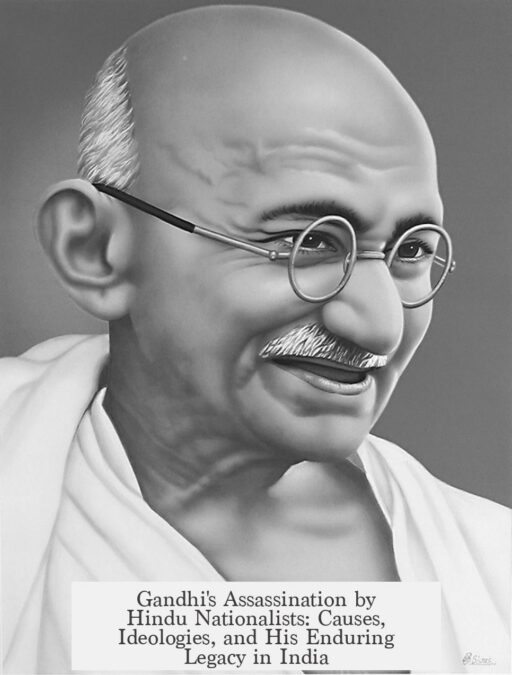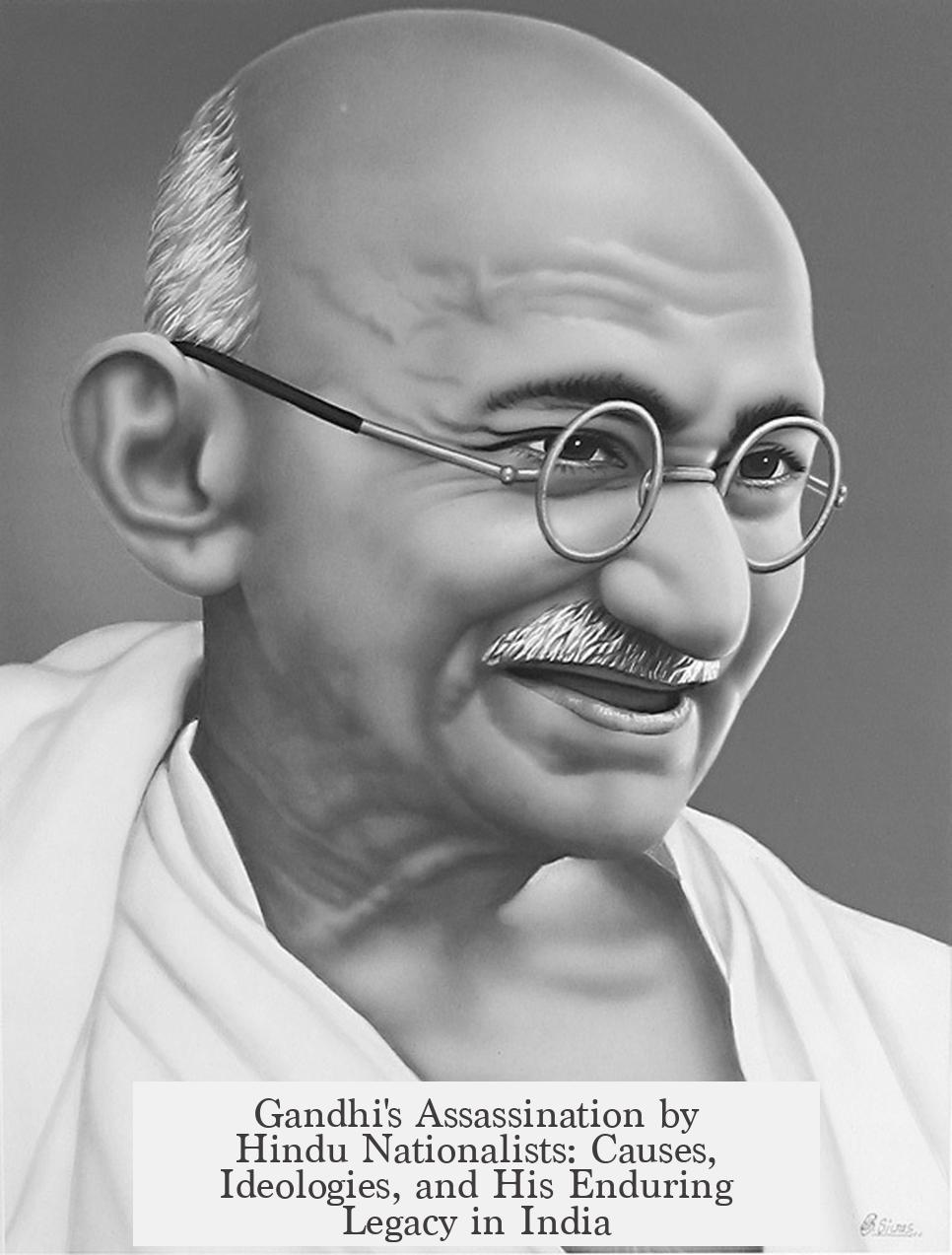Mohandas Gandhi was assassinated by Hindu nationalists due to deep ideological conflicts and dissatisfaction with his policies regarding religion and nationhood. His assassin, Nathuram Godse, and his associates belonged to Hindu nationalist groups that opposed Gandhi’s vision of a secular India. Gandhi’s legacy remains a symbol of peace, nonviolence, and unity, though it is complex and contested in India today.
The assassination of Gandhi occurred on January 30, 1948. Nathuram Godse, the main conspirator, was a former member of Hindu nationalist organizations, notably the Hindu Mahasabha and the Rashtriya Swayamsevak Sangh (RSS). While there is debate regarding Godse’s exact status in the RSS at the time, his connection to Hindu nationalist ideology is clear. Godse and his co-conspirator Narayan Apte were executed in November 1949 for the crime.
Godse’s motivations stemmed from his belief that Gandhi’s leadership weakened Hindu interests. He felt Gandhi’s accommodation of Muslims compromised Hindu identity and security. Gandhi supported the use of Hindustani—a mixture of Hindi and Urdu—as a national language to foster harmony between Hindus and Muslims. Godse opposed this, viewing it as favoring Muslims over Hindus.
More strongly, Godse blamed Gandhi for the Partition of India, which created Pakistan as a separate Muslim state. Godse saw this as a betrayal that deprived Hindus of their rightful land, since Hindu nationalists envisioned an undivided “Hindu Rashtra” covering areas lost to Pakistan. Godse also criticized Gandhi for fasting in protest to protect Muslims killed in India while remaining silent about Hindus killed in Pakistan.
The ideological foundation for these views comes partly from Vinayak Savarkar, a key figure in Hindu nationalism and author of the book Hindutva. Savarkar described a Hindu identity tied to nation, culture, and race, explicitly excluding Muslims and Christians who were seen as outsiders to the Indian “Holy Land.” Hindu nationalists sought a nation-state defined by this identity, which conflicted directly with Gandhi’s inclusive vision of secular citizenship and religious equality.
Godse and his co-conspirators reportedly sought Savarkar’s blessing before the assassination, symbolizing how the act was motivated by an extremist interpretation of Hindutva. This ideological clash explains why Gandhi’s nonviolent, inclusive approach faced deadly opposition from Hindu nationalist extremists, who feared loss of Hindu dominance and land.
Regarding Gandhi’s legacy in India, it remains multifaceted and influential. He is widely revered as the “Father of the Nation” and a symbol of nonviolent resistance. He played a critical role in mobilizing Indians against British colonial rule using nonviolence and civil disobedience. This methodology inspired global leaders and movements advocating peace and justice.
Gandhi’s legacy also includes advocating for religious harmony and upliftment of marginalized communities. His ideas on social reform, simplicity, and self-reliance continue to resonate. Yet, parts of Indian society, especially Hindu nationalists, critique him. Some view his concessions to Muslims and his acceptance of Partition as weaknesses that fractured Hindu unity.
Officially, Gandhi’s image remains embedded in Indian national symbols. His portrait appears on currency notes, and numerous memorials and holidays honor him. Educational curricula teach his philosophy and role in Indian independence. Despite differing opinions, his contributions to India’s political and social fabric are undeniable.
- Gandhi was killed by Hindu nationalists who opposed his inclusive and secular vision of India.
- Nathuram Godse felt Gandhi compromised Hindu interests, especially regarding Muslim relations and Partition.
- Vinayak Savarkar’s Hindutva ideology influenced the Hindu nationalist opposition to Gandhi.
- Gandhi’s legacy combines his role as a leader of independence, advocate of nonviolence, and symbol of religious harmony.
- His image and ideals remain central in India’s identity despite complex contemporary debates.
Why Was Gandhi Assassinated by Hindu Nationalists and What Is His Legacy in India?
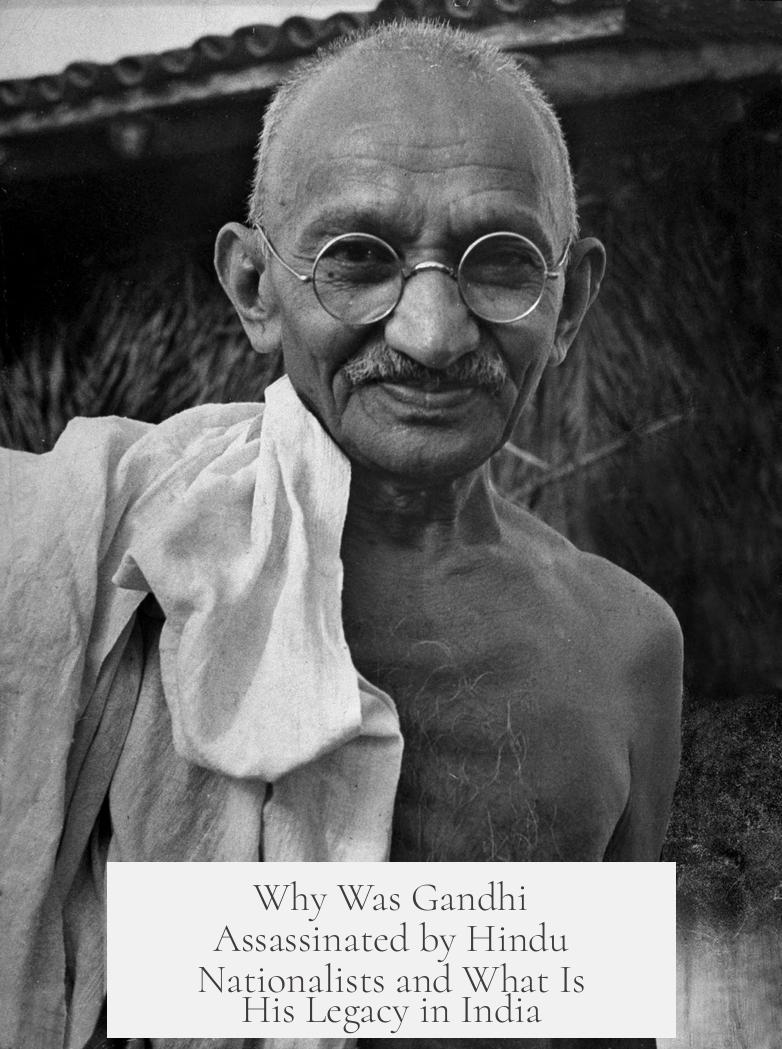
Mohandas Karamchand Gandhi, the “Father of the Nation” in India, met a tragic end on January 30, 1948, at the hands of Nathuram Godse, a Hindu nationalist. But why exactly did Godse, along with others like Narayan Apte, decide to assassinate Gandhi? And what legacy does Gandhi leave behind in today’s India? Let’s unpack this complex story.
The Assassination: A Fatal Clash of Ideologies
Gandhi’s assassination wasn’t a spur-of-the-moment event. It was a brutal outcome of intense political and ideological rivalries. Nathuram Godse and his associates, all linked to Hindu nationalist organizations like the Hindu Mahasabha and Rashtriya Swayamsevak Sangh (RSS), believed Gandhi’s vision threatened their idea of a Hindu nation.
Godse and Apte were swiftly brought to trial and executed on November 15, 1949. The Indian government, under Home Minister Vallabhbhai Patel, reacted by banning the RSS momentarily—until the group pledged loyalty to India’s Constitution.
So what was the crux of the disagreement? The Indian Constitution established a secular republic, emphasizing equal treatment regardless of religion. Hindu nationalists, on the other hand, pushed for setting up a Hindu Rashtra, a Hindu nation, excluding those who didn’t fit their definition.
Nathuram Godse’s Grievances: More Than Just Hatred
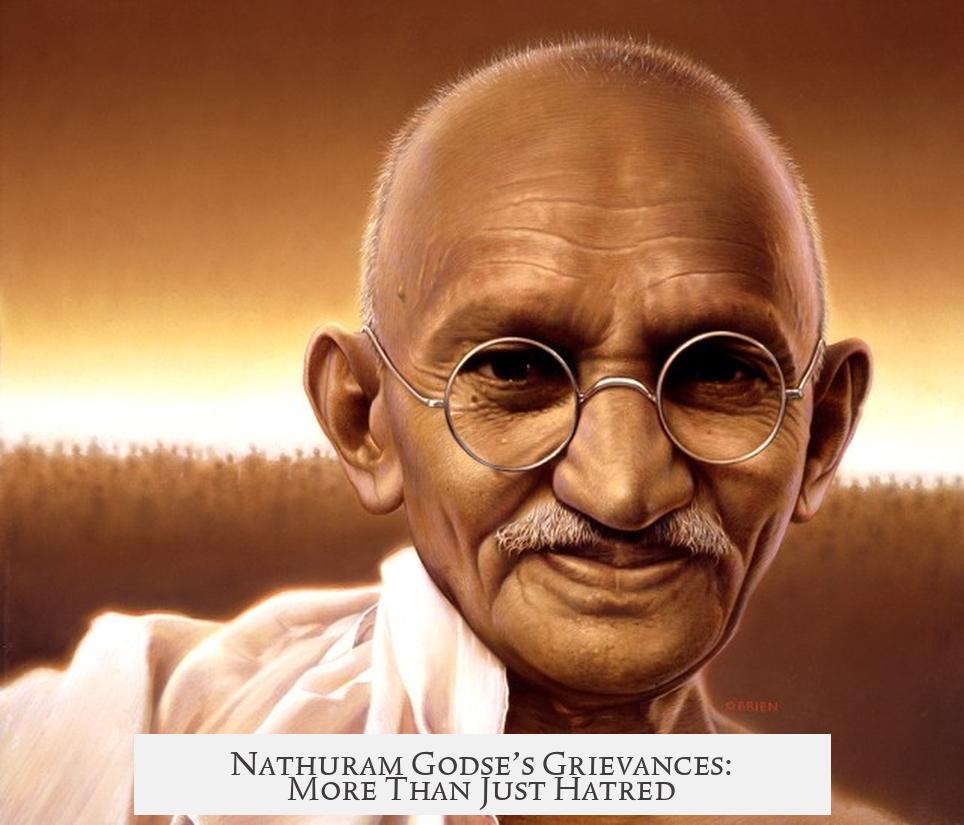
Godse’s motivations are surprisingly detailed and documented, partly due to his brother Gopal Godse’s testimony and Gopal’s later book, Why I Assassinated Gandhi. In court, Godse harshly criticized Gandhi’s leadership despite the undeniable achievement of India’s independence in 1947.
Godse viewed Gandhi as overly authoritarian, imposing his decisions on followers—“my way or the highway,” one might say. More importantly, Godse was infuriated by Gandhi’s accommodative attitude toward Muslims.
For example, Gandhi championed “Hindustani” as a national language to bridge communities. Godse despised this; he believed such gestures marginalized Hindus. Godse blamed Gandhi for the painful Partition of India which split British India into India and Pakistan—losing vast Hindu-majority areas to the new Muslim nation.
Perhaps the most controversial point: Godse called Gandhi hypocritical. Gandhi fasted to protect Muslims killed in India but remained silent about Hindus killed in Pakistan. To Godse and co-conspirators, Gandhi’s compromises betrayed Hindu interests.
The Role of Vinayak Savarkar and the Hindutva Ideology
Godse and fellow conspirators were heavily influenced by Vinayak Savarkar, the father of the Hindutva ideology. Savarkar’s 1923 book, Hindutva (meaning “Hinduness”), provides a foundational lens to understand Hindu nationalism.
Savarkar defines a Hindu by three criteria:
- One राष्ट्र (rashtra): The nation, spanning from the Indus River to the seas—India is both motherland and fatherland.
- One संस्कृति (sanskriti): A Hindu shares a common culture sanctified by this land, regarded as holy.
- One जाति (jati): A Hindu is a descendant of Hindu parents, proud of ancient heritage and bloodline.
This very definition excludes Muslims and Christians because it ties citizenship to religious and cultural identity and considers their holy lands to lie outside India. Savarkar’s vision of a Hindu Rashtra meant citizens belonged only if they fit these criteria.
Godse and his conspirators likely saw Gandhi as the biggest obstacle to this ideology—a man who envisioned a secular India rather than a Hindu-only nation.
The Fatal Frustration and Fear
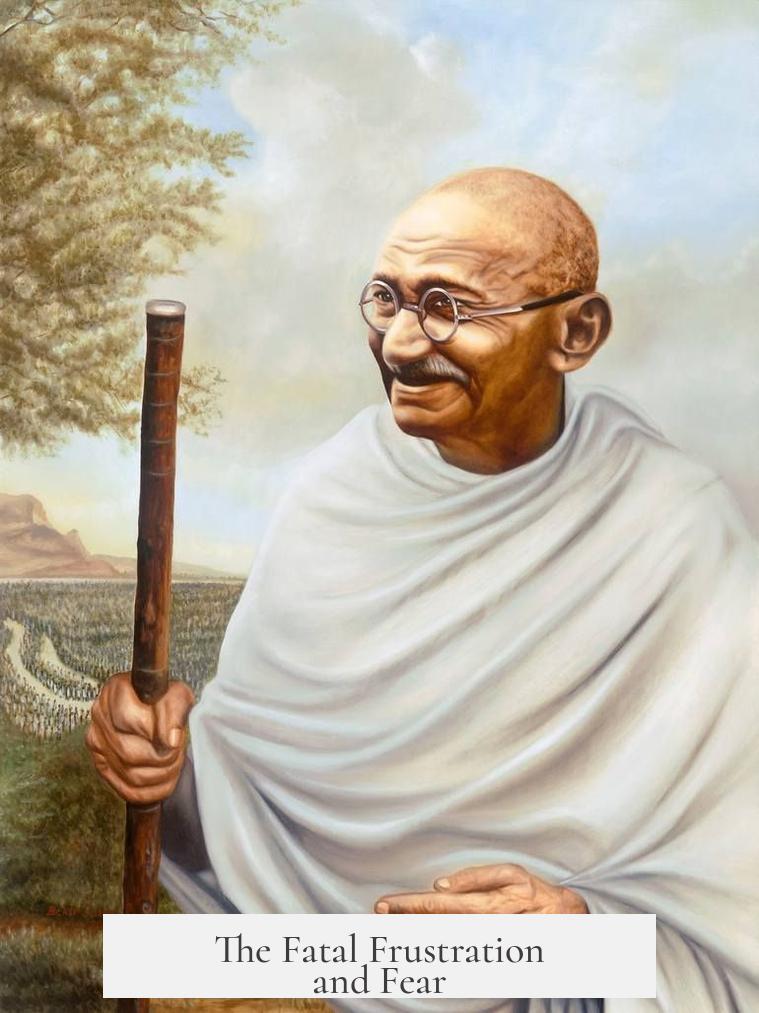
Why kill Gandhi? It boiled down to a mix of frustration and fear. Hindu nationalists believed Gandhi’s leadership mistakes risked the survival of Hindus in the new India. His continued efforts to accommodate Muslim interests and protect minority rights were viewed as blunders rather than statesmanship.
“If Gandhi keeps going,” they feared, “he’ll weaken the Hindu identity and make India smaller by conceding too much to Muslims.”
The assassination was their drastic attempt to stop what they saw as destructive appeasement and reclaim the vision of a Hindu nation. It was a political act, twisted by ideology, fear, and power struggles.
What About Gandhi’s Legacy in India?
Addressing Gandhi’s legacy is a vast, delicate topic. To many, he is the symbol of peace, nonviolence, and the fight for India’s independence. His principles of ahimsa and truth resonate around the world.
Yet, Gandhi remains a polarizing figure. Hindu nationalists continue to challenge his role, critiquing his compromises and political choices.
But even with controversies, Gandhi’s image endures on every rupee note and in the Indian conscience. His shadow looms large in India’s public memory, reminding citizens of the struggle for freedom and a vision of coexistence.
What Can We Learn from This Turbulent History?
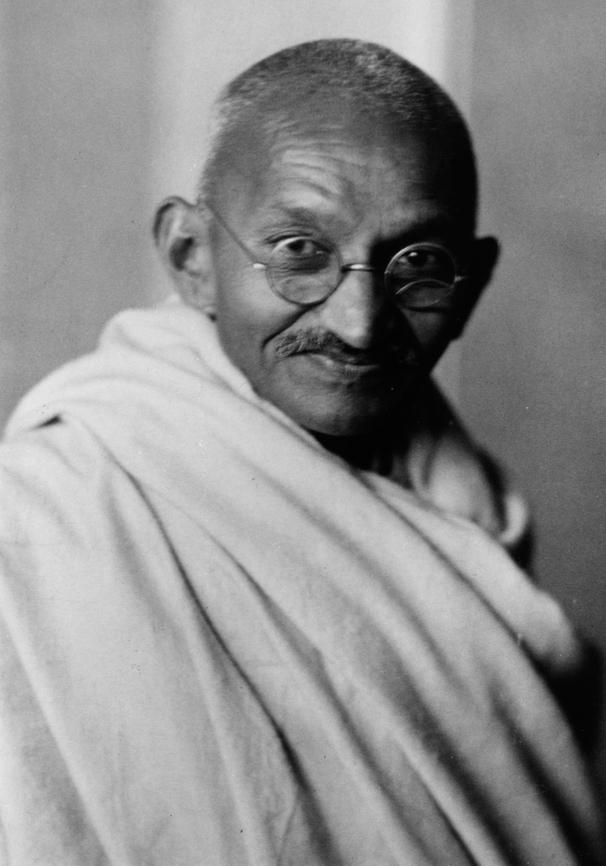
Gandhi’s assassination by Hindu nationalists reveals how dangerous ideological divides can become. It warns about how political leaders’ visions and decisions impact communities differently, sometimes with tragic consequences.
At the same time, Gandhi’s legacy challenges us. Should India be a nation defined by religion or by equal rights for all? Is Gandhi’s vision of inclusiveness outdated or still the ideal?
These questions remain alive in contemporary debates. Examining history with facts, not myths, helps us understand our present and shape a future that honors diversity without erasing identity.
In Conclusion
Gandhi was assassinated by Hindu nationalists mainly because his vision clashed sharply with theirs. He promoted a secular India, inclusive of all religions, and made compromises that they interpreted as betrayals of Hindu interests. Influenced by Savarkar’s idea of Hindutva, Godse and his associates saw Gandhi as an obstacle to their dream of a Hindu Rashtra.
While tragic, the assassination underscores the complexity of India’s journey. Gandhi’s legacy lives on as a reminder of nonviolence, tolerance, and the unresolved tensions between inclusiveness and identity politics—a legacy as relevant today as ever.
Why did Nathuram Godse see Gandhi as a threat to Hindu interests?
Godse believed Gandhi favored Muslims over Hindus. He felt Gandhi’s push for Hindustani over Hindi sidelined Hindus. Godse also blamed Gandhi for accepting the Partition, which divided land Hindu nationalists wanted unified.
What role did Vinayak Savarkar’s ideology play in Gandhi’s assassination?
Savarkar’s book Hindutva defined Hindus by race, culture, and nation, excluding Muslims and Christians. Godse and others were influenced by this vision of a Hindu nation, which clashed with Gandhi’s secular approach.
Why was the RSS banned after Gandhi’s assassination, and why was the ban lifted?
India’s Home Minister banned the RSS due to links with Godse and his co-conspirators. The ban was lifted a year later after the RSS agreed to abide by India’s Constitution and pledged loyalty to the nation.
How did Gandhi’s approach to religious harmony conflict with Hindu nationalist views?
Gandhi sought equal respect for all religions and supported the Muslim League’s demand for Pakistan. Hindu nationalists wanted a Hindu Rashtra where citizenship was tied to Hindu identity. This ideological clash fueled hostility.
What lasting legacy did Gandhi leave in India despite opposition?
Gandhi remains a symbol of peace and secularism. His image is on all Indian rupee notes. Though opinions vary, his influence on India’s freedom and identity endures deeply across the country.
